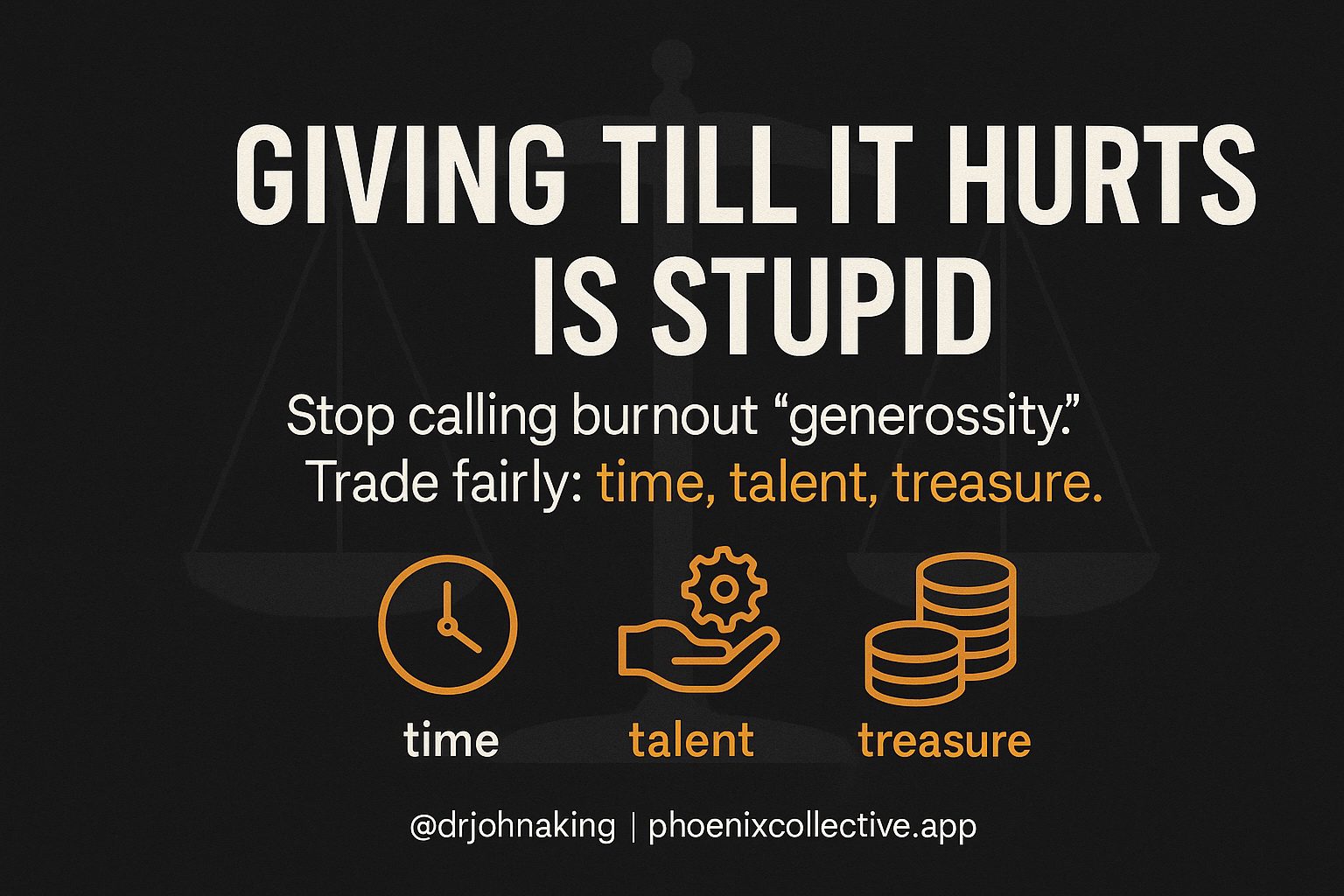Dr John A. King Giving: Till It Hurts Is Stupid
Stop calling burnout “generosity.” Start making fair trades: time, talent, treasure.
We hear the phrases all the time: giving till it hurts, generous to a fault. Somewhere along the way, a good virtue got twisted into self-neglect. As kids we’re taught to share, and that is right. You give a toy, you gain a friend. Even then, there is an exchange. Later, many of us drift into a mindset of endless output. We keep giving long after the return has disappeared, then wonder why we feel empty, broke, or resentful.
Here is a better frame.
Giving vs. Trading
There are three things you can be generous with: time, talent, treasure.
With your inner circle, aim to out-serve one another. Husbands, wives, kids, family. That is covenant. You give because you are building a life together.
Outside that core, most relationships are not covenant. They are exchanges. Healthy exchanges are honest and mutual. I offer time, talent, or treasure. You offer time, talent, or treasure. The trade can be unequal at times, but it cannot be nonexistent. If I keep pouring out and nothing comes back, I am not generous. I am getting drained. That is not noble. It is unsustainable.
Rule of thumb: If a relationship only withdraws and never deposits, it is not a relationship. It is a leak.
The Three Levels You Need
Keep your world organized into three lanes:
- Mentors: People who pour into you. They challenge you, speak truth, open doors.
- Peers: People who walk alongside you. Iron sharpens iron. You trade value regularly.
- Those You Serve: People you pour into without asking for a return. You invest because you choose to.
You want all three. But the majority of your relationships should live at the peer level. If your life is stacked with only those you serve, you will burn out. If it is stacked with only mentors, you will never take responsibility. Balance matters.
The Permission You Might Need
If you have been trained to “give till it hurts,” you may need a permission slip. Here it is:
- You are allowed to reassess any relationship that leaves you emotionally or financially bankrupt.
- You are allowed to ask for reciprocity.
- You are allowed to stop engaging where there is no return and no respect.
This is not about scorekeeping. It is about stewardship. You are responsible for your time, your talent, and your treasure. You cannot give what you no longer have.
A 10-Minute Relationship Audit
Grab a piece of paper and draw three columns: Time, Talent, Treasure. List the top 10 people or projects outside your inner circle.
For each line, answer:
- What do I give here? (time, talent, treasure)
- What do I receive here? (time, talent, treasure)
- Do I leave energized or depleted?
- Is this relationship a mentor, peer, or serve lane?
Then decide:
- Keep and clarify: It is mutual, but expectations are fuzzy. Have a simple conversation about roles or cadence.
- Rebalance: Too many serve-lane commitments. Shift two of them back to peer-lane trades.
- Release: No return, no respect, no progress. Stop feeding the leak.
Simple Boundaries You Can Use
- “Happy to help. Here is what I need in return: a quick intro to X or 30 minutes of your expertise on Y.”
- “I can give one hour this month. If we need more, let’s scope a simple agreement.”
- “I value our friendship. I want it to stay balanced, so let’s plan something that serves us both.”
Healthy people respect boundaries. Unhealthy people test them. That test tells you what you need to know.
Generous and Wise
Be generous. Be quick to serve your inner circle. Be kind to strangers. And be wise everywhere else. When giving becomes constant output with no input, it stops being generosity. It becomes self-harm dressed as virtue.
Your life will always have three lanes running at once: mentors who lift you, peers who steady you, and people you lift. Keep them in proportion. Trade fairly. Protect your capacity. Then your generosity will have fuel for the long haul.
Question for you: Which relationship needs a boundary or a conversation this week? Drop a comment and tell me the sentence you plan to use. I read them all.


